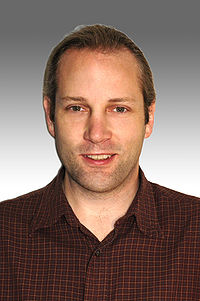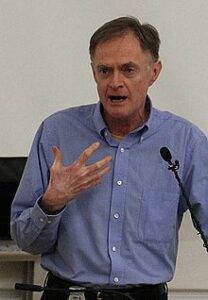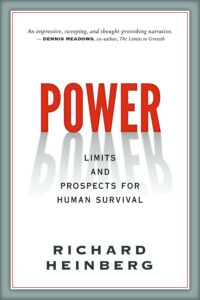Space physics expert Professor Thomas W. Murphy warns government and corporate plans are impossible. The growth game is OVER. We are never going back to “normal”. Post Carbon Institute Fellow and author of 14 books Richard Heinberg says “The renewable energy transition is failing”. Is he giving up? Should we give up? Dive into the deep end this week with Radio Ecoshock.
Listen to or download this Radio Ecoshock show in CD Quality (57 MB) or Lo-Fi (14 MB)
================================
THE SEAWEED BLOB: A NEW OCEANOGRAPHIC EVENT
A giant blob of seaweed, wider than the United States, is heading toward the Caribbean, Florida and Gulf Coasts. It can be seen from space. This is a brand-new oceanographic event, created by a combination of global warming, deforestation, and agricultural fertilizers. That is how the bloom doubled in a month to a size never seen before.
Just listen to this description by world-Sargasso expert Brian LaPoint, speaking to CNN’s Rosemary Church Thursday March 16:
Brian LaPointe, a research professor at Florida Atlantic University’s Harbor Branch Oceanographic Institute. LaPointe, who has studied it for four decades, told Rosemary Church:
“This is an unusual year in that this Sargassum bloom in the Great Atlantic Sargassum belt started early. It doubled in size between December and January. In one month it doubled in size, and it was larger in January that it has ever been, since this new region of Sargassum growth began in 2011. So this is an entirely new oceanographic phenomenon. Previously the Sargasso was in the Sargassum Sea to the north, that is the central gyre of the North Atlantic Ocean. It would circulate in the current around that as well as through the Caribbean, and the Gulf of Mexico. So this is a whole new thing.
And this the source of this Sargassum seaweed that is creating such a problem, really a catastrophic problem for tourism in the Caribbean region where it piles up on beaches up to five or six feet deep on the beaches in some places.”
He goes on to say the rotting seaweed in the Gulf of Mexico and elsewhere takes away the oxygen (anoxia) in areas that should be nurseries for fisheries. When rotting on beaches Sargassum gives off toxic hydrogen sulfide gas and it is so heavy with arsenic that care should be taken by workers cleaning it off. In Barbados this year, authorities estimated it would take 1600 dump truck loads a day to clear off tourist beaches. When the seaweed clogs coral reefs and mangroves – no one can clean it up and these essential ecosystems are damaged.
SEE ALSO
A giant seaweed bloom that can be seen from space threatens beaches in Florida and Mexico
Seasonal sargassum blooms have exploded in the tropical Atlantic over the past decade and more. This year’s is already staggeringly large.
SCIENTISTS STILL DON’T KNOW THE RESPONSE OF LIVING THINGS TO CLIMATE
The peak seaweed load for the U.S. beaches is still to come, likely in summer. The stink of rotting seaweed is part of our evolutionary warning system of a very toxic gas: hydrogen sulfide. Sargasso was known to early European sailors and they avoided that swirl of currents, known as the North Atlantic Gyre. But now, due to hotter seas and winds shifted by global warming, the currents have changed, pushing out this seaweed mat further south. It exploded in size and here it comes.
This is a signal missed in far too many climate models and expert predictions. Computers can model the atmosphere, ocean currents, chemical changes and five types of energy – but we tend to leave out the response of living things in a climate shift. When I interview plankton experts, they still don’t know whether plankton will flourish or crash as the oceans warm. This response by the Sargasso weed came as a complete surprise to oceanographers.
As the world warms, living things from microscopic to large mammals will change. Many species will disappear while invasive species take over. The carbon budget on land and sea changes, and that is the X factor when we try to estimate the speed and amount of climate change. Or even when we try to plan our own lives. Nature will respond to our pollution and attacks, with chaos and new arrangements. Watch for signals from living things.
====================================
THOMAS W. MURPHY – IMPOSSIBLE GROWTH
Imagine children born into a wealthy family. Wealth is all they know. The family empire is expanding. That is normal. The children inherit money, but spend it all by the age of 30. The business fails. Now they need to live on much, much less. That is who we are in the developed world, at the end of the age of fossil fuels.
Maybe you need to come from outer space to see this clearly on a small planet. In way, our guest Professor Thomas W. Murphy Jr. spent a lot of time in space. For almost two decades he led the APOLLO project, a network of Observatories. They used lasers reflecting off the Moon to test fundamental physics, from Newton to Einstein and beyond. It is super-physics stuff. But since 2020, Dr. Murphy put more attention on challenges to human survival on this planet. He was one of five founders of the Planetary Limits Academic Network.

Thomas W. Murphy, Professor of Physics, University of California Center for Astrophysics and Space Sciences
Listen to or download this 26 minute interview with Thomas Murphy in CD Quality or Lo-Fi
Since the 1972 “Limits to Growth” report, a lot of scientists and activists warned humanity will bump up against barriers. But the global economy continues to grow, along with our damage and emissions. The Limits to Growth people were dismissed as alarmists who were demonstrably wrong. Murphy says none of the problems reported in 1972 have been solved. Many continued to grow worse. The Limits to Growth study suggested civilization may fall apart by 2040. We aren’t there yet.
In the late 1970’s, Italian mathematician and engineer Roberto Vacca predicted the collapse of civilization before 1990. Collapse would develop due to complexity failure in systems that support developed life. Then computers enabled humans to manage more complexity. Vacca’s “Coming Dark Age” never came. Predicting failure does not have a good track record.

Radio Ecoshock reviewed the work of the late French philosopher Paul Virilio. He too warned of a breakdown of globalized civilization, – not due to failure, but too much success!
These days, long-standing institutions start to look fragile. Anything-you-can-get-away with becomes prevalent. Murphy’s work testing the Laws of Physics brings a fresh perspective. He insists there is a reality, and there are Laws. These Laws do not depend on punishment, because they are perfect. No one can break them.
From the Preface to Murphy’s free textbook:
“We live in a physical world governed by physical law. Unlike the case for civil or criminal law, we are not even afforded the opportunity to break the laws of physics, except in fiction or entertainment.We do not need to create a physics police force or build physics jails or plead cases in front of some physics court. Nature provides perfect, automatic enforcement for free.”
In November 2021, the Planetary Limits Academic Network published a paper called “Modernity is incompatible with planetary limits: Developing a PLAN for the future”. Tom Murphy was the Lead Author. In the Abstract they say: “All currently living humans, and most academic disciplines, have developed in this age, which appears normal and indefinite to us.” There is a profound danger in the constant demand after each crisis – to return to “normal”. That normal of the 1960’s and ’70s was unstable and unsustainable in the long run. We are entering that long run now.
We also discuss Tom’s piece published in the journal Nature Physics, July 2022. That paper title is simple: “Limits to economic growth”. You can read that paper free here.
All of us depend upon the eternal growth fantasy in one way or another. Murphy writes:
“Interest rates, bank loans, home mortgages and pension plans rest on the assumption of growth. The funding of social safety nets such as Social Security and Medicare in the United States is predicated upon both economic growth and growth of the labour pool.”
If growth ends, the Ponzi scheme of borrowing from the future must end. Millions could be homeless or hungry. Is it dangerous to suggest this growth spurt could and should end?
Murphy also writes:
“Just as a meteorologist somehow born and trained within a 15-minute fireworks display likely cannot make useful predictions about weather and sky conditions over the next week, we are ill-equipped to intuitively understand what comes after the present phase.”
So are we just helpless in the developing chaos of change?
WHO WANTS TO FREE THE ENERGY SLAVES?
This is….“ the most insanely unusual period of the human experience.”
— T.W. Murphy
Historians argue whether James Watt’s invention of the steam engine enabled the British to end slavery. Murphy calculates the average human now has 20 energy servants, and every American has 100. We are living better than Royalty in the past. Why would anyone give that up? I suppose eventually the Laws of Physics and other natural forces will make us change or die.
WASTE HEAT – DOES IT ADD TO GLOBAL WARMING?
Tom’s work also touches on another question many of our listeners ask. We know our energy system produces carbon dioxide, but it also generates a lot of waste heat. Everything from electronics to car exhausts leak heat into the atmosphere. Does waste heat contribute to global warming? It does, but only a small fraction of the heat caused by excess greenhouse gases. Carbon dioxide, methane and nitrous oxide remain the biggest threats to our future.
But the contribution of waste heat is increasing along with our energy use. Taken to an absurd example, if we managed to keep burning fossil fuels as we do now, for a couple of hundred years, the ocean would reach the boiling point. Boiling oceans. We expect fossil fuels would run out or be abandoned long before that point.
I think waste heat is important for two more reasons: first, even if it only warms Earth by a fraction of a degree, we recently learn that every 1/10th of a degree more warming can be very important to avoid.
Second, urban heat is building on global warming adding to the death toll during extreme heat waves.
You get a good take into waste heat and Tom Murphy in this YouTube video by Sabine Hossenfelder: “I recently learned that waste heat will boil the oceans in about 400 years.”
This is what Tom Murphy actually says about boiling oceans:
“At present, the waste heat term is about four orders of magnitude smaller than the solar term. But at a growth factor of ten per century, they would reach parity in roughly 400 years. Indeed, the surface temperature of Earth would reach the boiling point of water (373 K) in just over 400 years under this relentless prescription.
Clearly, extrapolating our recent — seemingly modest — 2.3% annual energy growth very far into the future quickly becomes ridiculous, and cannot happen.”
YOUR FREE ONLINE TEXTBOOK FROM TOM MURPHY
Bypassing the publishing system, Tom offers his free online textbook “Energy and Human Ambitions on a Finite Planet”. As you might expect from a physics scientist, this is the real deal. I looked into a few sections of the book and started learning. It would take me about a month to read this textbook, take notes, and brush up on my own math and science enough to follow along though his proofs. In my opinion, nobody should graduate from any college or university without learning from “Energy and Human Ambitions on a Finite Planet”.

====================================
RICHARD HEINBERG:
FAILURE OF THE RENEWABLE REVOLUTION
For decades, Richard Heinberg led the charge to get off fossil fuels. Now he says “The renewable energy transition is failing”. Is he giving up? Should we give up?

Heinberg is author of 14 books like “The End of Growth” and “Powerdown”. His most recent book is “Power: Limits and Prospects for Human Survival”. You may have seen Richard in documentaries like “The End of Suburbia” or “Planet of the Humans” and DiCaprio’s “Eleventh Hour”. He was among the first bloggers in the energy and climate arenas, with his “Museletter” – now around issue #359. Richard is Senior Fellow at the Post Carbon Institute.
Listen to or download this 29 minute interview with Richard Heinberg in CD Quality or Lo-Fi
Richard Heinberg spent decades investigating the limits of energy on this planet, with articles and books about coal, oil, and gas depletion. In his newer work, I’m hearing as much concern about the limits of minerals.
To build the power system world leaders promise, it sounds like we need a new era of mining. The last mining era was not so great. It was infamous for human rights abuse, dying miners, and pollution from heavy metals and toxic chemicals. How big would mining have to be to build all the solar panels, wind machines, and new electric vehicles we think we need? Heinberg says even industrial-grade sand is getting in short supply.
In Heinberg’s recent article at resilience.org, he introduce us to Simon Michaux of the Finnish Geological Survey. Simon wrote a report called “Assessment of the Extra Capacity Required of Alternative Energy Electrical Power Systems to Completely Replace Fossil Fuels.”
In his report Summary, Simon Michaux says:
“Knowledge around known mineral resources suggests the raw materials required for the manufacture and servicing of these renewable technologies will remain truly global in nature. There will not be one nation or geographic region that can be truly self-sufficient.”
That is another problem for the renewable energy revolution: it requires a system of global cooperation and trade. Instead, we are seeing a split into major blocks, with one war in progress and others possible. There are trade sanctions on some materials needed for making wind turbines, solar, and all those new electric vehicles. The geopolitical divide as another important stumbling block for really achieving renewable products and power. We can only do it together, as a species.
Michaux concluded we need “a significant reduction of societal demand for all resources” and that “implies a very different social contract and a radically different system of governance to what is in place today.” But the current system of government is built to resistance to change. That is backed by police, jails, and the armed might of the military. It is hard to imagine governments will change very much. But sometimes the unimagined happens.
You and I see energy descent as fundamental to any effort to save ourselves. The Secretary General of the United Nations agrees. Instead, Joe Biden just authorized a huge drilling project by ConocoPhillips in the farthest north Arctic of Alaska. Those fossil fuels will not come online until 2029 or 2030, the years when every major agency and institution says we need to be slashing fossil use, not adding more. The UK government just approved more gas fracking. Everybody is plunging ahead into a dead-planet future.
BACK TO DEGROWTH
A planned descent would be better than just falling into chaotic pieces. In the interview, we discuss the Degrowth movement. Just for listener information, there was a Degrowth workshop on 26 February 2023 in Melbourne Australia. Another conference “ Beyond Growth 2023” will be held May 15, 2023 in the European Parliament in Brussels. And the The 9th International Degrowth Conference will take place Aug 29 to Sept. 2 2023 in Zagreb Croatia. But there is very little organizing for degrowth in the United States or Canada.

=================================
WRAP UP
I want to thank all listeners for your tips and emails. Write me any time: radio@ecoshock.org.
Next week we explore ways El Nino is speeding sea level rise from Antarctica, and why the south polar sea ice is at a record low. Plus: what happens if repeated crisis-level events take away our ability to fight off the worst of climate change? The U.N. is predicting more than a catastrophe a day around the world by 2030. A UK think-tank has already worked through this darker view of the near future… join us again next week.
This program is listener-supported science journalism. Please contribute if you can to keep Radio Ecoshock on the air and free to everyone.
I’m Alex Smith. Thank you for wanting to find out, and caring about this world.
Pingback: Nuclear news – week to 27 March | Nuclear Australia